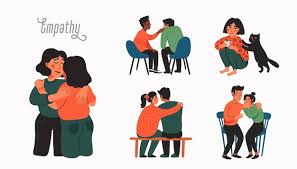Unraveling the Power of Empathy: Why Understanding Others is the Key to a Better World
- Anchoring Your Life

- Jun 9, 2023
- 3 min read
In today's fast-paced and interconnected world, empathy, the ability to understand and share the feelings of others, seems more important than ever. However, as paradoxical as it may sound, empathy can also be a double-edged sword, presenting challenges that can impact individuals and their relationships negatively. In this article, we will explore why empathy is a problem in society, shedding light on its potential drawbacks while acknowledging its significant benefits. We will delve into the negative impacts of empathy on oneself and relationships, emphasizing the importance of seeking support, such as marriage counseling in Redlands or online Australia-wide, to navigate these complexities effectively.
The Dark Side of Empathy
Empathy, when taken to extremes, can lead to emotional exhaustion and burnout. When individuals constantly absorb the emotions and struggles of others without establishing healthy boundaries, they risk neglecting their own well-being. This can result in chronic stress, anxiety, and a compromised mental and emotional state. It becomes crucial to strike a balance between understanding others' feelings and prioritizing self-care.
Moreover, an excessive focus on empathizing with others can hinder personal growth. Constantly trying to accommodate and please others can prevent individuals from setting boundaries and asserting their own needs, desires, and aspirations. Consequently, personal goals and aspirations may be overshadowed, leading to feelings of resentment, unfulfillment, and a lack of self-identity.
The Impact on Relationships
Empathy, when not practiced with discernment, can pose challenges in relationships as well. While empathy promotes understanding and connection, an excessive amount can result in emotional dependency and an inability to differentiate between one's own emotions and those of others. This can blur the lines between self and others, leading to a loss of personal autonomy and a weakened sense of individuality within the relationship.
Additionally, an overdose of empathy can breed enabling behavior. When empathy becomes a default response, individuals may inadvertently support negative behaviors or unhealthy patterns in their loved ones. By excessively empathizing, they might unintentionally validate destructive choices or enable self-destructive behaviors. This can strain relationships and hinder personal growth for both parties involved.
The Benefits of Being Empathetic
While there are potential pitfalls of empathy, it is important to note its undeniable benefits. Empathy forms the foundation of emotional intelligence, enabling individuals to connect deeply with others, build trust, and foster meaningful relationships. By understanding and acknowledging the emotions of others, we create a safe and supportive environment that promotes open communication and strengthens bonds.
Furthermore, empathy plays a crucial role in conflict resolution. By actively listening and empathizing with different perspectives, individuals can find common ground and work towards mutually beneficial resolutions. In relationships, empathy can foster compassion, enhance intimacy, and create a nurturing environment where both partners feel heard, valued, and understood.
Navigating the Complexities: Seeking Support
When the challenges of empathy become overwhelming, seeking professional help can be immensely beneficial. Debra, at Anchoring Your Life Counselling Redlands, offers a supportive and non-judgmental space where individuals and couples can explore the impact of empathy on their relationship dynamics. Clients are provided guidance in setting healthy boundaries, practicing self-care, and cultivating effective communication skills. Through therapy, clients can learn to strike a balance between empathy and self-preservation, ensuring the well-being of both individuals and the relationship itself.
In summary, empathy, while a powerful and necessary aspect of human connection, can present challenges in today's society. It is important to recognize the potential negative impacts of empathy on oneself and relationships. By finding a balance between empathy and self-care, individuals can cultivate healthy emotional boundaries, personal growth, and resilience. Seeking professional support, such as relationship counseling in Redlands, can provide invaluable guidance in navigating the complexities of empathy and fostering healthy relationships.

Debra Bragança is a registered Counsellor with The Australian Counselling Association and works with both adults and couples impacted from trauma, anxiety, chronic illness, depression and relationship issues, including affairs.
She is trained in a number of evidence-based therapies including CBT (Cognitive Behaviour Therapy), CPT (Cognitive Processing Therapy), ACT (Acceptance & Commitment Therapy) and Gottman Couples Therapy, including Affair Recovery.






